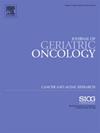台湾癌症衰弱工具之发展与验证:一项前瞻性纵向研究。
IF 3
3区 医学
Q3 GERIATRICS & GERONTOLOGY
引用次数: 0
摘要
导言:台湾老年人口中癌症发病率的增加,凸显出需要一种与文化相适应的衰弱评估工具。本研究旨在开发并验证一种专为台湾老年癌症患者设计的虚弱筛查仪器,以预测生存结果。材料与方法:前瞻性纳入2018年7月至2020年12月在台湾三家医院接受治疗前新诊断的年龄≥65岁的癌症患者参与研究。参与者按3:1的比例随机分为开发组和验证组。选取综合老年病评估(CGA)的关键变数,制作台湾癌症衰弱工具(TCFT)。测试了TCFT评估虚弱和预测生存结果的能力。结果:总体而言,在招募期间纳入了692名患者,其中开发和验证队列分别为519名和173名。TCFT是基于来自CGA的5个多变量分析因素(体重减轻、活动受限/转移、跌倒、认知功能受损和多药)开发的,每个因素以最高5分的二元评分。与CGA作为金标准相比,TCFT在开发组和验证组预测脆弱的受试者工作特征曲线下面积分别为0.79(95%置信区间[CI]: 0.75-0.83)和0.86 (95% CI: 0.80-0.91)。在开发组和验证组中,TCFT得分越高,生存期越短(风险比[HR]: 2.39-6.99和10.2-88.3)。(p)讨论:我们的研究表明,TCFT能有效预测台湾老年癌症患者的虚弱和生存,证明TCFT是一种文化敏感的筛查工具。未来的研究应该针对更广泛的应用,并在不同的临床环境中验证。本文章由计算机程序翻译,如有差异,请以英文原文为准。
Development and validation of the Taiwan Cancer Frailty Tool for older patients with cancer: A prospective longitudinal study
Introduction
The increasing occurrence of cancer in Taiwan's older population highlights the need for a culturally attuned frailty assessment tool. This study aimed to develop and validate a frailty screening instrument specifically designed for older Taiwanese patients with cancer to predict survival outcomes.
Materials and Methods
Patients aged ≥65 years newly diagnosed with cancer before treatment initiation at three Hospitals in Taiwan were prospectively included from July 2018 to December 2020 to participate in the study. Participants were randomly divided into development and validation groups with a 3:1 ratio. Key variables from the comprehensive geriatric assessment (CGA) were selected to create the Taiwan Cancer Frailty Tool (TCFT). The ability of the TCFT to evaluate frailty and predict survival outcomes was tested.
Results
Overall, 692 patients were included over the recruitment period, with 519 and 173 in the development and validation cohorts, respectively. The TCFT was developed based on five multivariate analysis factors from the CGA (weight loss, restricted mobility/transfer, falls, impaired cognitive function, and polypharmacy), scoring each factor binary with a maximum score of five. The areas under the receiver operating characteristic curve for the TCFT in predicting frailty were 0.79 (95 % confidence interval [CI]: 0.75–0.83) and 0.86 (95 % CI: 0.80–0.91) in the development and validation groups, respectively, compared with the CGA as the gold standard. Higher TCFT scores correlated with shorter survival (hazard ratio [HR]: 2.39–6.99 and 10.2–88.3) in the development and validation groups, respectively, (p < 0.001).
Discussion
Our study suggests that the TCFT effectively predicts frailty and survival among older Taiwanese patients with cancer, proving to be a culturally sensitive screening tool. Future studies should target a wider application and validation across diverse clinical settings.
求助全文
通过发布文献求助,成功后即可免费获取论文全文。
去求助
来源期刊

Journal of geriatric oncology
ONCOLOGY-GERIATRICS & GERONTOLOGY
CiteScore
5.30
自引率
10.00%
发文量
379
审稿时长
80 days
期刊介绍:
The Journal of Geriatric Oncology is an international, multidisciplinary journal which is focused on advancing research in the treatment and survivorship issues of older adults with cancer, as well as literature relevant to education and policy development in geriatric oncology.
The journal welcomes the submission of manuscripts in the following categories:
• Original research articles
• Review articles
• Clinical trials
• Education and training articles
• Short communications
• Perspectives
• Meeting reports
• Letters to the Editor.
 求助内容:
求助内容: 应助结果提醒方式:
应助结果提醒方式:


